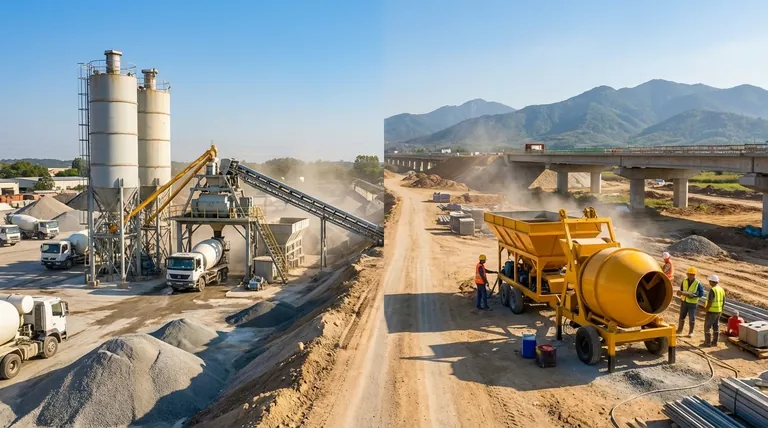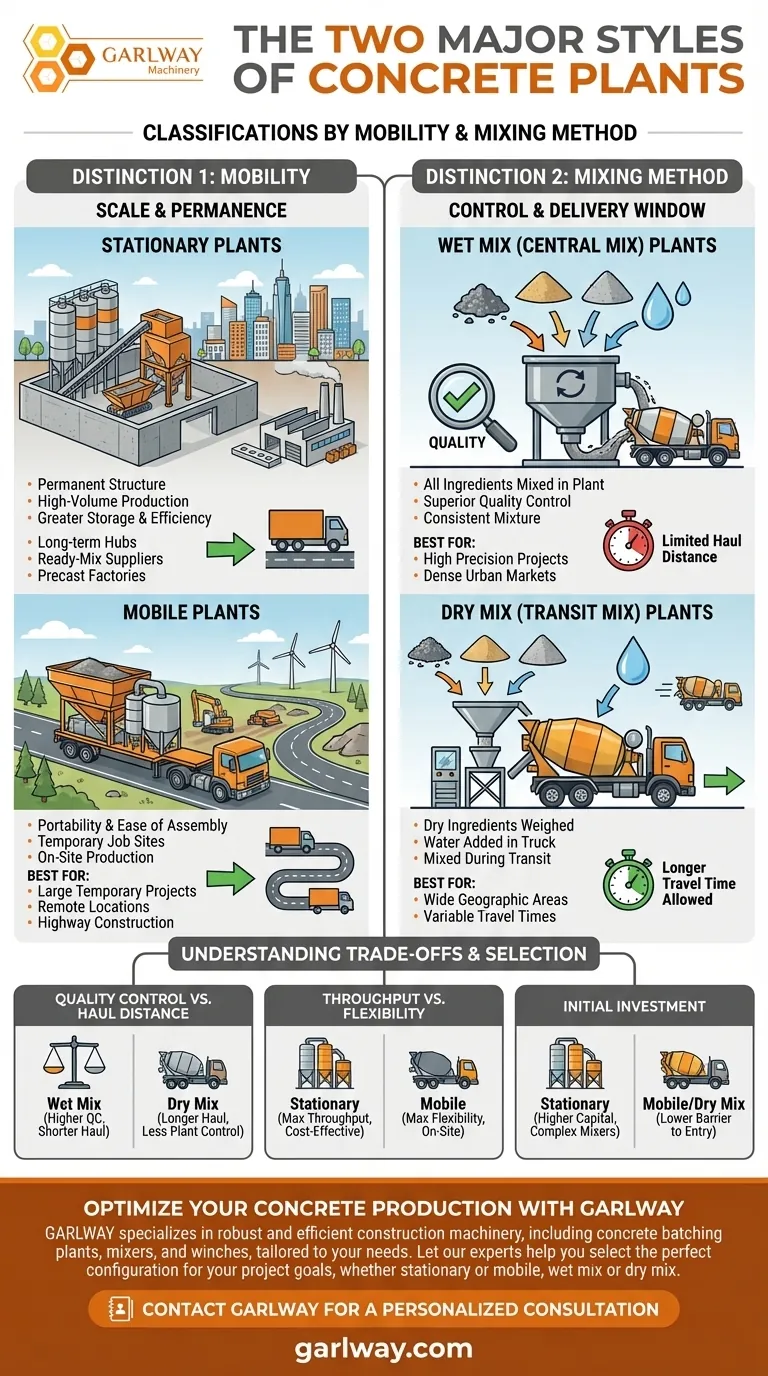The two major styles of concrete plants are defined by two distinct classifications: one based on mobility (Stationary vs. Mobile) and the other on mixing method (Wet Mix vs. Dry Mix). While seemingly different, these classifications are not mutually exclusive; a plant is characterized by a combination of both, such as a "Stationary Wet Mix Plant."
The choice between concrete plant styles is not about finding the "best" one, but about selecting the right tool for the job. Your decision hinges on balancing project scale, required quality control, and logistical constraints like location and travel time.

The First Distinction: Mobility
The most visible difference between plants is whether they are built to stay in one place or move between job sites. This dictates the scale and permanence of the operation.
Stationary Plants: The High-Volume Hub
Stationary plants are permanent structures designed for long-term, high-volume production at a single location. They are the backbone of ready-mix suppliers serving a specific metropolitan area or large-scale precast concrete factories.
Their size and stability allow for greater storage capacity, more complex batching systems, and higher overall output and efficiency.
Mobile Plants: The Flexible Field Unit
Mobile plants are engineered for portability. They are designed to be broken down, transported, and reassembled at different job sites with relative ease.
This makes them ideal for large but temporary projects, such as highway construction, remote wind farm foundations, or any job where on-site concrete production is more practical than delivery from a distant stationary plant.
The Second Distinction: Mixing Method
This classification is based on where the concrete is actually mixed. It has a direct impact on quality control and the delivery window for the finished product.
Wet Mix (Central Mix) Plants: Precision and Control
In a wet mix plant, all ingredients—aggregate, sand, cement, and water—are combined and thoroughly mixed in a large, centralized mixer at the plant itself.
The resulting concrete is then discharged into a truck mixer for transport. This process offers superior quality control and ensures a highly consistent mixture and slump before it ever leaves the plant.
Dry Mix (Transit Mix) Plants: Simplicity and Range
A dry mix plant, often called a ready-mix or transit-mix plant, weighs all the dry ingredients and discharges them into the truck mixer. Water is then added to the truck's drum either at the plant or upon arrival at the job site.
The truck's rotating drum performs the mixing during transit. This method allows for a longer travel time from the plant to the job site, as the hydration process (and thus, hardening) doesn't begin until the water is introduced.
Understanding the Trade-offs
Each plant style represents a different solution to a logistical challenge. Choosing one over the other involves clear trade-offs.
Quality Control vs. Haul Distance
Wet mix plants provide the highest degree of quality control because the mixing is completed in a controlled environment. However, this starts the clock on the concrete's setting time, limiting the viable haul distance.
Dry mix plants cede some control to the truck driver and transit conditions but gain the significant advantage of being able to deliver concrete much farther away from the plant.
Throughput vs. Flexibility
Stationary plants are built for maximum throughput and efficiency, making them the most cost-effective solution for producing massive quantities of concrete day after day.
Mobile plants sacrifice some of that raw output for the invaluable flexibility of being able to set up operations exactly where the concrete is needed, eliminating long haul times and associated costs.
Initial Investment
Typically, large stationary, wet mix plants represent a higher initial capital investment due to their complex mixers, larger footprint, and permanent infrastructure. Mobile and dry mix plants can offer a lower barrier to entry.
Selecting the Right Plant for Your Project
Your project's goals will determine the ideal plant configuration.
- If your primary focus is maximum quality control for a precast factory or a dense urban market: A stationary, wet mix (central mix) plant provides the best consistency and efficiency.
- If your primary focus is supporting a series of large but temporary construction sites: A mobile plant offers the crucial flexibility to move your production hub with the project.
- If your primary focus is serving a wide geographic area with variable travel times: A dry mix (transit mix) plant is the industry standard, ensuring fresh concrete can be delivered over longer distances.
Understanding these fundamental classifications empowers you to align your production strategy with your project's unique demands.
Summary Table:
| Classification | Plant Type | Key Characteristics | Best For |
|---|---|---|---|
| Mobility | Stationary Plant | Permanent, high-volume production, greater storage capacity | Long-term projects, ready-mix suppliers, precast factories |
| Mobility | Mobile Plant | Portable, easy to transport and reassemble | Temporary job sites, remote locations, highway construction |
| Mixing Method | Wet Mix (Central Mix) | Ingredients mixed at plant, superior quality control, consistent mixture | Projects requiring high precision, dense urban markets |
| Mixing Method | Dry Mix (Transit Mix) | Dry ingredients mixed in truck, longer travel time, flexibility on haul distance | Wide geographic areas, variable travel times |
Ready to Optimize Your Concrete Production?
Choosing the right concrete plant is critical to your project's success, budget, and timeline. GARLWAY specializes in providing robust and efficient construction machinery, including concrete batching plants, mixers, and winches, tailored to the needs of construction companies and contractors worldwide.
Let our experts help you select the perfect plant configuration—whether stationary or mobile, wet mix or dry mix—to maximize your efficiency and ROI.
Contact GARLWAY today for a personalized consultation and discover how our solutions can power your next project!
Visual Guide

Related Products
- JZC400 Mobile Small Concrete Mixer Cement Mixer Machine
- HZS35 Small Cement Concrete Mixing Batch Plant
- Portable Electric Concrete Mixer Machine for Cement Mixing
- HZS180 Ready Mix Concrete Plant for Foundations with Sand and Cement
- HZS120 Ready Mix Concrete Batching Plant Commercial Mud Cement Mixer
People Also Ask
- What is the capacity of a small concrete mixer? Choose the Right Size for Your Project
- How do electric portable cement mixers differ from gas-powered ones? Choose the Right Power for Your Job Site
- How much concrete can you mix in a small mixer? Achieve Perfect Batches for Your Project
- What are the main advantages of a mobile concrete mixer? Gain On-Site Control & Cost Savings
- How does a mobile concrete mixer benefit businesses? Boost Efficiency & Cut Costs On-Site

















